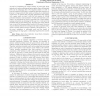Free Online Productivity Tools
i2Speak
i2Symbol
i2OCR
iTex2Img
iWeb2Print
iWeb2Shot
i2Type
iPdf2Split
iPdf2Merge
i2Bopomofo
i2Arabic
i2Style
i2Image
i2PDF
iLatex2Rtf
Sci2ools
89
Voted
ICASSP
2011
IEEE
2011
IEEE
Social norm and long-run learning in peer-to-peer networks
We start by formulating the resource sharing in peer-to-peer (P2P) networks as a random-matching gift-giving game, where self-interested peers aim at maximizing their own long-term utilities. In order to provide incentives for the peers to voluntarily share their resources, we propose to design protocols that operate according to pre-determined social norms. To optimize their long-term performance when playing such a game, peers can learn to play the best response by solving individual stochastic control problems. We first show that when a peer learns in an environment in which its opponents play a fixed strategy, learning will provide an advantage for this peer (i.e. it will lead to an increased utility for the learning peer). If all the peers in the network learn, we prove that learning remains beneficial for the peers. Moreover, we prove that the network will converge to the “fully-cooperative state” (where a socially optimal outcome is attained) if the update error of the peer...
ICASSP 2011 | Pre-determined Social Norms | Random-matching Gift-giving Game | Self-interested Peers | Signal Processing |
Related Content
| Added | 20 Aug 2011 |
| Updated | 20 Aug 2011 |
| Type | Journal |
| Year | 2011 |
| Where | ICASSP |
| Authors | Yu Zhang, Mihaela van der Schaar |
Comments (0)

